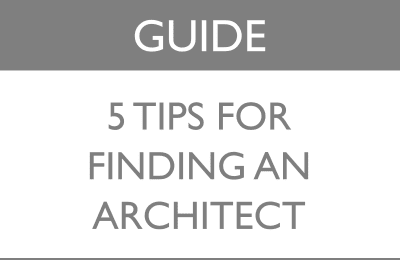
Finding a good architect who will be a good fit with you on your project is important. Here’s how you can find one that’s right for you.
Congratulations you’ve taken the plunge! You have either bought a piece of land, you have a house that needs a total renovation or maybe you just want to renovate your own home. Perhaps the piece of land already has outline planning permission, or perhaps it doesn’t. Your renovation may be a simple knock through or a bog-standard extension at the back. Whatever the project you are about to embark on, you will need to consider whether or not you need an architect or you may be simply be wondering: how do I find an architect?
Below are top 5 tips to help you make a decision.
Tip 1: Do I need an architect?
This will very much depend on the type of project you have and what you want at the end.
As a general rule, the more complex the project and the more ‘out of the ordinary’, the more likely an architect will be needed. If you are planning a simple renovation – say a loft conversion or an extension – you have the choice to work directly with your builder (using a ‘design and build’ contract), working with a specialist firm (people who do nothing else apart from loft conversion say), an architectural technician or even just a chartered surveyor.
If you have planning, you don’t technically need an architect, but I think it would be wise to use one unless you are using one of the specialist firms. The downside of using anyone other than an architect (i.e. a loft company) is that they will apply a standard approach to your loft.
If you want to do something a bit special, you would be better off with the assistance of an architect.
In terms of doing a self-build, again, the same logic applies. If design is important to you or the planning is going to be difficult, then you are better off going with an architect.
You may also consider paying a planning consultant too if you are likely to run into fierce opposition.
Tip 2: Pick the right size team for the job
Most of the architects that we know follow a similar path in their career.
When they’re young, they join a large firm. Shortly after that they decide to set out on their own. It’s likely that their first few commissions will be on renovations or extensions from friends or family. Then, they’ll pick up more domestic commissions from friends of friends. If some of their projects do really well and they win some awards, they will likely pick up more work that way.
Many will enter competitions for public projects – often commissioned by local authorities. They then start doing work for developers on larger commercial projects.
There’s a balance to be had, but we would always recommend that you pick a firm which is at the right stage of growth to give you the attention you need. Too big a firm, and your job will get lost in the workload, too small and the firm may not have the experience to properly carry it out.
Generally, if it’s a renovation, extension or loft conversion, architects that are a small practice will be able to cope with this.
If it’s a new build, especially if it’s particularly complicated – either through the construction element or the planning side – it would be better to go with a practice that is more experienced and has a wider network of contacts as you may need a larger team.
Tip 3: Don’t expect architects to do or know everything
One of the common misconceptions is that once you employ an architect, you will not need any other professionals. Unfortunately this is unlikely to be the case.
At a minimum, most projects will require a structural engineer. However, increasing complexity will mean that the professional team might have to include planning consultants, cost consultants and M&E consultants (plumbing and electrics).
New builds may also have to have other specialists, such as fire or drainage consultants.
We often hear complaints of a lack of communication between architect and client. Clients sometimes expect architects to not only be the designers of the project, but also to teach them what they need to be doing next.
Unless you are specifically employing your architects to be project manager, it would be unfair to expect them to tell you when to order tiles, how many or what type. Same is true of all of the other ‘client supply’ items.
You must understand that it is your responsibility to manage the programme and figure out what you need to do to enable your project to stick within your budget and time constraints.
Tip 4: There is a tension between design and build-ability
Great architects want to build great projects. They put good design at the heart of what they do. Your project is their next piece of branding, so it’s of little surprise that good architects will be more attracted to doing interesting projects for clients who value design. However, this can be a source of tension.
Good design is often more difficult and more expensive to build. It takes more time and more consideration not only from the architect, but also from the rest of the professional team. Architects will go to all sorts of trouble to hide cables and pipes behind walls, whereas a builder will just ‘box’ them in.
This is why you will often find a tension between builders and architects. Builders want to just get on with the job as they may have done it in the past a hundred times, whereas an architect will want to consider just how the edge of the window aligns with the staircase or how the floor meets the wall.
In our experience, the devil is often in the detail and that’s where good design lies.
Sometimes inexperienced architects may draw something which they haven’t actually worked out how to build. For example, they are assuming that they will be able to source a piece of kit which can do that job. If you’re on a tight budget, it’s important to quiz the architect on those items.
There’s a saying amongst builders: “it’s better to build with things you can buy, than things you can order”.
As a client, you will need to work out what is more important to you and be clear about that from the outset. If you want a job done simply and quickly and aren’t so bothered about the finer details, you should consider the architect that you employ, or whether you need one at all by going direct to a builder.
If a highly considered design is of upmost importance, then you will need to find a contractor who understands that and has an excellent network of specialist suppliers to find that unique product to enable the architect’s drawings to be built.
Tip 5: How to be a good client
First, understand what’s important to you and make sure that you hire an architect in line with your personality and your ambition.
Second, be clear in your brief and don’t change your mind. This is the biggest issue of any project. It’s better to take much longer in the planning stage and get it right on paper so that once you’re in the construction phase, you aren’t making costly modifications. Changing your mind not only opens you up to budget increases, it extends the time of the project and demoralises the project team.
Third, understand your role in the project. If you are going to act as project manager, then you need to make sure you are organised, you have everything you need and know what you’re doing. It’s not fair to expect professionals to enlighten you with project management education.
Finally, enjoy the process. Building a new house or doing a new extension is a great experience but small things will go wrong, budgets will be stretched and projects may be delayed.
In the end all will be worth it and it’s important to keep focused. You are the leader of the team and you need to keep momentum and motivation high. Celebrate the successes and don’t get too stressed about the lows.
So those are our top 5 tips on how to find an architect. If you’re looking to take on a self-build project and want to find a plot of land to build on, consider signing up to our custom build register below.
New to Unboxed Homes?
We make self-build easy. We build customisable eco friendly new homes that you fit out yourself, or we fit out for you.
If you’ve ever wanted to build your own home but have been daunted by the idea or you want a project but don’t want the risk of buying a Victorian terrace that needs modernising, then sign up for our newsletter or our custom build register and we will send you emails with opportunities and land for sale that has been vetted as a good opportunity by our MD Gus Zogolovitch
Be the first to know about our newest projects
Find a plot for your custom build project



